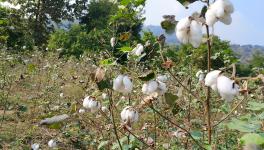GM Crop Regulation: Government Continues to Remains Lackadaisical
Image for representational use only.Image Courtesy : asia.nikkei.com
Several hundred farmers belonging to the Shetkari Sanghatana (SS) in the Akola district of Maharashtra – protesting against the government’s “apathy and indecisiveness” – went ahead and planted unapproved herbicide tolerant (Ht) GM cotton on June 10.
The government’s indecisiveness, the farmers believed, was directly linked to their failure in approving new technology in agriculture. This failure had spanned over a decade and they believed there is no resolution in sight for their dilemma. They did this despite knowing that under the Environment Protection Act, 1986, growing GM crops is illegal and could result in a jail sentence of five years or a fine of Rs one lakh.
Within a fortnight, the Maharashtra state government, not wanting to be seen to be lagging, filed FIRs against 12 farmers for having violated different provisions of the Seeds Act, Protection of Plants Variety and Farmers Act and the Custom Act of 1962.
But growing illegal GM (Ht) cotton is not confined to just Maharashtra. Thousands of farmers are known to be growing it across Telangana, Andhra Pradesh and Gujarat. The Lok Sabha was informed on July 2, 2019 that as many as 67 cases were being probed by the police and as many as 9,387 illegal cotton seed packets and 1,087 kg of loose cotton seeds worth over Rs 102 lakh have been confiscated across these states.
According to a high-level committee report submitted to the government in 2018, nearly 15% of cotton grown in India could be illegal Ht cotton. This fact highlight that thousands of farmers are growing illegal Ht cotton. The question before these respective state governments is just how many farmers can they file charges against.
Kavita Kurungati of the Alliance for Sustainable and Holistic Agriculture believes the views of the SS cannot be taken too seriously since they are a “libertarian group with a clear right-wing bias”.
“Their leader, late Sharad Joshi, had been demanding the opening up of Indian markets saying, “Give us Walmart, give us Monsanto” and stuff like that. It is obvious that they are ignorant of science and the enormous amount of evidence that points to Bt cotton being a failed technology,’ said Kurungati.
She insists, “The SS is a fringe group with only a few hundred workers. No newspaper has highlighted how the majority of farmer unions in Maharashtra are opposed to GM crops. We need the government to hear more farmers’ voices on this issue.”
Karungati’s reservations are well founded. Bt cotton is the only GM crop that has been officially cleared for commercial production. Its official clearance came about in 2002. Since then, there has been a raging debate about the nature of GM crops and the kind of impact they have on our health and environment. This debate may be several years old, but India has, so far failed to develop any official policy on GM crops. The government is moving from a case to case approval and this has its own limitations.
To cite an example, India’s regulatory body for transgenic products, the Genetic Engineering Appraisal Committee (GEAC), gave its approval to Bt brinjal in 2009 amidst nationwide protests. India is the second largest grower of brinjal in the world and hosts an enormous variety of indigenous varieties of this vegetable. When Minister of Environment and Forests at the time, Jairam Ramesh, decided to hold nationwide consultations about the safety and usefulness of Bt brinjal, his meetings were marked by huge protests from farmers, activists and scientists who questioned the need to introduce Bt brinjal given that it would harm the environment and also force the farmers to depend on seeds imported by multinational companies.
The debate was so intense that Ramesh was forced to place an indefinite moratorium on the commercial cultivation of Bt brinjal till a consensus on the safety of transgenic crops was achieved.
Agricultural activist Devender Sharma pointed out, “Jairam Ramesh held seven national consultations on Bt brinjal in seven places and then brought out a 19-page document with scientific evidence to show the shortfalls of this technology. Ramesh said that till such time as industry comes out with proper bio-safety tests, the commercial production of Bt brinjal must be stopped,” said Sharma.
But this debate has refused to go away. There have been several reports of Bt brinjal seeds being imported illegally to India from Bangladesh. Not only are they openly available in the market, but a farmer in Haryana purchased the seeds from the open market and then grew them in his half-acre field in Haryana in 2017.
When activists discovered he was growing Bt brinjal, they took up the matter with the GEAC. A large number of officials descended on his land to investigate. The crop was tested by the National Bureau of Plant Genetic Resources (NBPGR) in Delhi which confirmed the presence of GM traits and this led the Haryana agriculture department to force the farmer to uproot his crop.
Sharma said: “Farmers are being lured to believe Bt brinjal will give them higher yields, but even though it has received approval in Bangladesh, it is well known that it has not done well in that country.”
The other matter of concern that came up from the NBPGR report was that the samples from Haryana, while being genetically modified, did not have Mahyco’s cry1Ac transgene or the cry1Fa developed by the National Research Centre on Plant Biotechnology, Delhi, implying the GM seeds used by farmers might have not even entered the regulatory pipeline. They could have come straight from the lab to the field thereby reflecting a breach of security.
Kurunganti told this reporter that using unapproved seeds was alarming because this would leave farmers even more vulnerable as they would have no recourse in case of crop failure. The other matter of concern was that such usage breaches environmental and health safety of consumers, she said.
Kapil Shah, founder of Jatan Trust in Gujarat, emphasised that the illegal cultivation of illegal Bt brinjal reflected a failure of the concerned government agencies. “I have been saying all along that the GEAC behaves as a promotional and not as regulatory body,” said Shah.
“We saw the same indifferent reaction (from the GEAC) when soy cultivation was discovered in Gujarat in 2017,’ he added.
More recently, the debate has shifted to the introduction of GM mustard which was cleared by GEAC for commercial production in May 2017. This clearance also saw a fresh controversy erupting and had activist groups, scientists and medical experts writing to the NDA government opposing this clearance. Some activists also filed a case in the Supreme Court.
The Ministry of Environment asked the GEAC to review their decision which again left a large body of activists dissatisfied with the way the re-examination was conducted.
Kuruganti said, “The GEAC did not re-examine the issue. Rather, they asked the project proponent to do limited studies to assess the impact of GM mustard crop on honey bees, soil microbial activity etc. This, in any case, was one of the post commercial release condition recommended even earlier by GEAC and can hardly be said to constitute a review.”
Kapil Shah believes that the farmers in Maharashtra switching over to Ht cotton reflected their growing desperation to earn more money from their crops. That is why they are going to such lengths of using cotton seeds of dubious quality despite paying a steeper price—about Rs 1,200 per packet compared to Rs 730 for normal Bt cotton.
“But the basic question remains. When a crop is not approved by the government, how can they grow it? My question is when the government has a regulation in place, it is their job to enforce it,’ said Shah.
Extremely critical of the present government policy, Kapil Shah added, “Each and every crop has to go through a different scrutiny. Bt cotton, Ht cotton, all go through different scrutiny. The same is the case with Bt brinjal and GM mustard. Ht cotton has been tested, but not come to GEAC for final approval. Bt mustard was cleared by the GEAC, but the government has not given its final nod to it,” Shah pointed out.
One of the reasons for this is that agriculture is a state subject and several states are opposed to GM crops. Former Andhra Pradesh Chief Minister N Chandrababu Naidu called GM food crops a risk to ecology, health and commerce. Other states like Delhi, Bihar, Kerala and Tamil Nadu have also been critical of GM crops.
Meanwhile, illegal import of food products containing GM ingredients continue to make their way into India. In 2018, Rohit Parakh of India for Safe Food highlighted how GM seeds were being imported into India. This information was made public by no other body than the Ministry of Commerce whose data on imports of live seeds clearly indicates that India continues to import genetically modified seeds including GM canola, GM sugar beet, GM papaya, GM squash and GM corn seeds and also soybean from the USA and other countries without having received any approval from the GEAC as is the requirement.
In 2018, the Centre for Science and Environment tested 65 imported and domestically produced processed food samples in India and found that 32% of the samples tested were GM positive. There were brands that claimed on their labels they were GM-free, but were tested to be GM positive.
Even though the Modi government has not given an official green signal for the commercial production of GM crops in the country, it was obvious that it was pushing them. Kuruganti said, “Field trials (of GM crops) are being cleared even though state governments don’t want GM technology. We are witnessing large imports of live seeds and packaged foods from GM-producing countries. All this has happened during the last five years,” said Kuruganti.
Again, Parliament was informed last year that the production of cotton in India has doubled since Bt cotton was introduced in 2002. But activists came down heavily on these claims stating that cotton production has increased because the area under cotton had increased and because groundnut farmers were shifting to growing cotton.
This debate is raging on. Scientists from the biotechnology sector want India to take the path of GM crops but the MoEFCC, continues to take an ambivalent stand. They are waiting for the Supreme Court to take a final decision on this subject. The government is also afraid of some farmer groups including the Swadeshi Jagran Manch’s opposition to GM crops because the Manch is an affiliate of the powerful RSS who are opposed to GM crops.
Dr Suman Sahai convenor of Gene Campaign who has been a bitter opponent of GM technology for over two decades is extremely critical of the lack of regulatory mechanisms for handling this issue.
Sahai said: “How can the farmers be allowed to take law into their hands and defy the regulators? If laws can be broken on this subject, they can be broken on any other matter as well. The government needs to be more vigilant.”
Sahai believes, “This is not a sustainable technology because it is well known that pests develop a resistance against all technologies. Look at DDT once used to control malaria. It is not used any longer. It is the same with Bt.”
Sahai is of the opinion that the government has little interest in agriculture or for that matter the concerns of the farmers. “They continue to pay lip service otherwise how could they allow Bt seeds to flood our markets. Their strategy is simple. Now that the seeds are here, we may as well as legalise it,” she said.
And that is the direction in which they are moving.
Get the latest reports & analysis with people's perspective on Protests, movements & deep analytical videos, discussions of the current affairs in your Telegram app. Subscribe to NewsClick's Telegram channel & get Real-Time updates on stories, as they get published on our website.
























